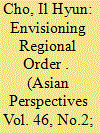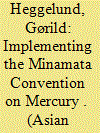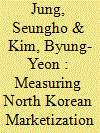|
|
|
Sort Order |
|
|
|
Items / Page
|
|
|
|
|
|
|
| Srl | Item |
| 1 |
ID:
186008


|
|
|
|
|
| Summary/Abstract |
Although South Korea has elected every president under the same democratic constitution since 1987, it has an ongoing puzzle: why do some presidents personalize their regimes (or at least made an effort to do so) while others remain democratic? To explain this puzzle, this study introduces a novel concept, a "lemon presidency." This is where a democratically elected president engenders a personalized regime that is backed by prejudiced judicial authorities such as courts and prosecutors' offices. South Korea experienced two lemon presidencies under Lee Myung-bak and Park Geun-hye. South Koreans viewed Lee and Park as true representatives of democracy during the 2007 and 2012 presidential elections; however, they turned out to possess an unrealistic sense of superiority and became semi-democratic rulers. They personalized political powers by exploiting their appointment and removal powers. Based on case studies and survey results, this study provides evidence for Lee's and Park's lemon presidencies. The overall analysis of this study envisions another lemon presidency in South Korea's future if voters choose to vote for a grandiose leader.
|
|
|
|
|
|
|
|
|
|
|
|
|
|
|
|
| 2 |
ID:
186009


|
|
|
|
|
| Summary/Abstract |
With its nuclear provocations and missile launches, North Korea has been viewed as a major impediment to building a cooperative security order in East Asia. What is puzzling, however, is that it is North Korea that has sparked a range of regional initiatives from South Korean governments. What is the role of North Korea in South Korea's search for a new regional order in East Asia? Does the nature of inter-Korean relations affect the types of regionalism sought by South Korean governments? To address these questions, I examine the scope and priorities of the regional initiatives led by the four South Korean presidents in the past two decades. I argue that the nature of inter-Korean relations and the foreign policy orientation of South Korean leaders in power explain the different types of regionalism pursued by South Korean governments.
|
|
|
|
|
|
|
|
|
|
|
|
|
|
|
|
| 3 |
ID:
186005


|
|
|
|
|
| Summary/Abstract |
This article examines governments' responses to food crises and famines in the nondemocratic world. After the sudden collapse of the Soviet Union, many of the remaining communist countries encountered an unprecedented level of food shortage and economic hardship, which, in turn, expedited or led to regime collapse. However, Cuba and North Korea are striking cases that have managed to survive the extreme situations from the 1990s onward. In this comparative-historical research, I argue that although the two countries implemented different coping strategies in light of domestic food distribution and international aid inducement, similar outcomes are observed in terms of regime survival. Despite the varied strategies, the state-mandated food politics were commonly mobilized through public rationing in these countries during the Cold War. This pre-crisis statecraft effectively disempowered the people, leaving them with a strong dependency on the state food systems and a weak voice of complaint against their governments.
|
|
|
|
|
|
|
|
|
|
|
|
|
|
|
|
| 4 |
ID:
186007


|
|
|
|
|
| Summary/Abstract |
China has undertaken a major shift in its position on mercury as an environmental problem over the last decade and a half. It ratified the Minamata Convention (MC) in 2016 and by doing so has committed to implement the treaty objectives. This article asks: How do we explain China's will and ability to implement its MC obligations? There is little systematic knowledge about the main factors underlying implementation of international mercury objectives in China, hence this article contributes new research on this important topic. We examine the implementation process, focusing on the coal sector and differentiate between indirect effects from other policies and direct efforts to implement obligations. We find that China has moved toward stricter regulation of mercury emissions and direct implementation of the Minamata Convention in the coal sector. However, our study shows that local implementation capacity needs improvement.
|
|
|
|
|
|
|
|
|
|
|
|
|
|
|
|
| 5 |
ID:
186004


|
|
|
|
|
| Summary/Abstract |
Since the traditional central planning system virtually collapsed in the 1990s, growth of marketization has become the most prominent feature of the North Korean economy. In this article, we evaluate the development of de facto and de jure marketization of the 2000s in three dimensions of price liberalization, privatization, and financial system development. Accordingly, we construct a marketization index using the survey results of North Korean refugees and expert evaluations of the North Korean economy. The marketization level generally increased over the years despite the unfavorable foreign and domestic environments such as international sanctions and the anti-market polices of the mid-2000s. Among the three evaluation categories, price liberalization has advanced the most, whereas financial system development has developed the least. In particular, de facto privatization has rapidly expanded since Kim Jong Un came into power. However, from the economic reform perspective, the overall institutionalization level of the informal economy in North Korea still remains low compared to those of former socialist economies.
|
|
|
|
|
|
|
|
|
|
|
|
|
|
|
|
| 6 |
ID:
186010


|
|
|
|
|
| Summary/Abstract |
Factors for geopolitical conflict and power balance still exist potently in intra-regional politics in Northeast Asia. The role of a third country that could increase the possibility of creating an international regime as an institution is important. In the past, Mongolia did not receive a lot of attention in intra-regional or regional political affairs, as its military and economy were weak compared to other countries in the region. However, despite being a landlocked country surrounded by both China and Russia, Mongolia has used its geographical position strategically as a neutral state that can contribute positively to regional cooperation in Northeast Asia and proactively has proposed a constructive role and function for itself. As Mongolia aligns itself to the national interests of its regional neighbors and creates possibilities for regional cooperation, it is seeking a new role in Northeast Asia.
|
|
|
|
|
|
|
|
|
|
|
|
|
|
|
|
| 7 |
ID:
186006


|
|
|
|
|
| Summary/Abstract |
Scholars have found that election interference by a foreign power can increase political partisanship in a targeted state and can be an effective tool for throwing weight behind a candidate. We know less about how domestic political actors respond to election interference and how this affects the intervener's strategies over time. Since Taiwan held its first direct presidential election in 1996, China has used numerous tactics to influence Taiwan's elections. Taiwan's political parties have adapted to China's interference, with targeted candidates campaigning on election interference, and non-targeted candidates seeking to play a mediating role with Beijing. In response, China's tactics have shifted: the broad threats of earlier elections have been replaced with narrowly targeted efforts to mobilize Beijing-friendly segments of Taiwan's population.
|
|
|
|
|
|
|
|
|
|
|
|
|
|
|
|
|
|
|
|
|